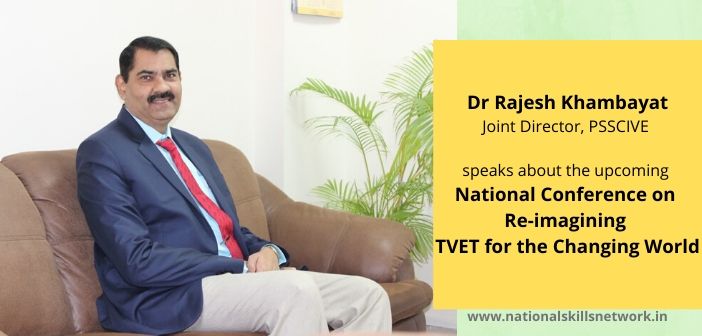Pandit Sundarlal Sharma Central Institute of Vocational Education (PSSCIVE) is holding a National Conference on “Re-imagining Technical and Vocational Education and Training (TVET) for the Changing World: Perspectives and Practices” on 11th – 12th February 2020. To understand the significance of the event in today’s era and various themes around which the sessions are designed in the conference, we caught up with Dr. Rajesh P. Khambayat, Joint Director, PSSCIVE (NCERT), Bhopal.
Q: How important is vocational education and training in today’s educational environment?
A: We are living in an exciting era of technology. Technology is influencing every aspect of our life, whether it is professional, personal or social life. Changes in technology are helping us in working from anywhere and anytime, which leads to a new work order. Technology is also helping the industrial sector, by improving their processes, programs, and production.
The world of work has drastically changed and is continuously changing. This is where technical and vocational education and training become important.
TVET is the main supplier of the skilled technical workforce. That is why many schemes and programs in India, including the draft of National Education Policy 2019 strongly advocate vocational education and training in India. This reiterates the fact that Skill Development and Vocational Education go hand-in-hand. Also, the 4th Industrial Revolution or Industry 4.0 is setting in. It demands new skills for emerging new jobs and occupations. So, there is a demand for the right skill set to be able to carry out the new job.
Q: There is a conception that technology will affect many of the current jobs. What is your opinion on this?
A: When the IT revolution was taking place, the same fear of losing the jobs prevailed. But it happened the other way around. It opened up new avenues and introduced many new sectors which we didn’t know. It expanded the number of jobs than we ever imagined. So, I would say it won’t reduce the number of jobs. But the routine jobs will definitely be impacted. Industry 4.0 demands new skills not only for the new entrants but also for the existing people and TVET has a significant role to play in upskilling and reskilling of the workforce.
Detailed Program: Re-imagining Technical and Vocational Education and Training (TVET) for the Changing World: Perspectives and Practices” on 11th – 12th February 2020. Click here to download the program.
Q: TVET is going to be important in handling many challenges. How are we preparing the curriculum, trainers, and teachers for this?
A: There are two important players in this – TVET Institutions and TVET educators or trainers. We have to understand the demands of the industries and the requirements of the workplace. Based on this, the demand-driven curriculum must be developed.
We have come up with a special session for this in the event – “Upskilling and reskilling of today’s workforce and TVET Teachers Development”. The panel discussion will look into the requirements for upskilling or reskilling of TVET teachers and trainers for developing a new workforce for Industry 4.0. We plan to come up with solutions for many other issues around this in the discussion. After a couple of days of the event, we will come up with a set of recommendations like a plan of action to be taken by different agencies.
For teacher development, we are coming up with a Diploma program in TVET. Considering the diversity of our country and the present status of vocational educators, we are intending it in both distance and contact mode. We hope a large number of audience will be befitted by this.
Related Interview: PSSCIVE Bhopal strengthens the foundations of vocational education in schools through effective Teacher Training, Research, and Development – Read More: https://nationalskillsnetwork.in/psscive-bhopal/
Q: Are we also looking at the potential of initiatives like blended learning or technology-enabled learning?
A: We have invited experts from Singapore and Korea to showcase their initiatives, where they are using technology for the professional development of teachers in their countries. It would be very interesting as it is in the form of a virtual presentation. And all the proceedings of the event are streamed online, so anyone can watch it from wherever they are.
At this conference, we don’t just want to discuss the few aspects of TVET, rather deliberate upon what should be the future agenda for TVET. We would like to look at the re-branding of TVET and building an image for it. Also, we will be focusing on transferable skills, as they are the most important for any job role.
One more thing I would like to add here is that India is diverse and we have many needs to fulfill and look into. We have rural schools, urban schools, children with special needs, etc. We have to make people across these areas aware of the importance of vocational education. For this, we are asking institutes and other stakeholders to integrate the art aspect into the vocation. The priority areas we would be focusing on are how to make vocational education more inclusive, how to link vocational education to further education, the sustainability aspect of it and many more.
To empower rural youth through vocational education, we have two dedicated sessions on it. One is “TVET Excellence and Innovation”, it will elaborate upon how the strategies taken by UNEVOC centers increases the opportunities for rural youth, improves sustainable livelihood, personal empowerment and socio-economic development.
The other session is “TVET for rural transformation and SDG 2030 implementation”. This session will look into how TVET can support the rural transformation, which is currently disruptive. The session will tell us how TVET can build the capacities of rural youth for various farm and non-farm activities and emerging employment opportunities.
We are also providing a platform in the event, where one can share good initiatives and practices taken in the space of TVET in strengthening the vocational training.














Comments 1